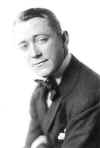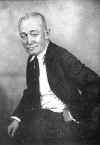Cohan 101
Cohan Bio: Part III
by John Kenrick
(Copyright 2002; revised 2014)
(All the photos on this page are thumbnail images – click on them to see larger versions.)
Going Solo
 George
M. Cohan sometime around 1910.
George
M. Cohan sometime around 1910.
The Yankee Prince (1908) marked the last joint appearance by The Four Cohans, as Josie went off on a solo career. Jerry and Nellie retired after the run of Broadway Jones (1912). George tried to retire himself, but found inactivity unbearable. Within months, he became busier than ever, working on several shows per season – producing, writing and occasionally "Cohanizing" the works of others. Cohan's adaptation of the novel Get Rich Quick Wallingford (1910) lasted on Broadway for more than a year. His mystery spoof Seven Keys to Baldpate (1913), intended as a special one-night event, ran a full season on Broadway and toured successfully. Cohan even starred in a silent film version.
Ziegfeld's Follies made revues a popular trend on Broadway. At first, these essentially plot-less shows always imposed some semblance of a plot. Cohan spoofed this trend in his first revue, Hello Broadway (1914). Between songs and sketches, the cast searched for an elusive box containing the plot. When eventually found, it turned out to be empty. Audiences enjoyed the joke, and Broadway revues thereafter did away with the forced pretense of a plotline.
Cohan's sister Josie unexpectedly died of heart failure in 1916, and his beloved father Jerry faced the same fate a year later. Emotionally devastated, George found comfort in his work. Still one of America's top songwriters, he owned his own music publishing firm, guaranteeing the fullest possible profit from every song. When the United States entered World War I in 1917, Cohan's stirring "Over There" captured the nation's sentiments –
So prepare, say a prayer,
Send the word, send the word to beware.
We'll be over, we're coming over,
And we won't come back
Till it's over over there.
At the end of the war, Cohan was in an enviable position. One of the best known men in America, he owned several Broadway theaters, had companies performing all across the country, and saw his operetta spoof Royal Vagabond (1919) unexpectedly become one of the biggest hits of the year. The dialogue still had a vaudeville ring to it, but with a sophisticated edge that made it "state of the art." He loved to spoof theatrical conventions, as when he had two characters make the following exchange –
(Offstage: sound of galloping horse)
PRINCE: Doesn't that sound like a horseman approaching?
TUTOR: Not exactly. But it's a good effect.
Admired by actors, writers, producers and the general public, it seemed that Cohan's reign on Broadway was more secure than ever. Then he made a colossal, life-altering mistake.
Equity: Battling Windmills
 Cohan
applying makeup in his dressing room, around the
time of the controversial Actor's Equity strike in 1919.
Cohan
applying makeup in his dressing room, around the
time of the controversial Actor's Equity strike in 1919.
During World War I, the United States had fought successfully for the cause of freedom in Europe, but slavery still reigned in the American theater. Most producers treated actors like cattle, rehearsing them for weeks without pay, subjecting them to exhausting tours, forcing them to work extra unpaid performances during holidays, and firing them without notice. Actors were even expected to provide their own costumes for most productions. Once the war was over, a number of actors banded together to form The Actor's Equity Association. When producers ignored demands for better working conditions, Equity called the first-ever actor's strike in the summer of 1919.
As a producer, Cohan had always been fair with actors. This old trouper found it unthinkable that any actor could ever refuse to perform. Insisting that acting was a profession and should therefore be above unionism, Cohan opposed to the formation of Equity. When Equity fulfilled its threats and closed down professional theatres nationwide, a furious Cohan founded a competing group called the Actor's Fidelity League -- and was genuinely surprised when his fellow actors branded him a traitor. Many openly wondered if Cohan's millions had helped him forget the treatment most performers were regularly subjected to.
Letting his emotions get the better of him, Cohan lashed out at Equity in speeches and in print. He warned that Equity would try to turn Broadway into a "closed shop" -- an accusation Equity's leaders refuted. Angry rhetoric poured forth from both sides. When Cohan proclaimed that he would quit the theater and run an elevator before giving in to Equity, comedian Eddie Cantor publicly pointed out that that elevator operators in New York City had to belong to a union!
After a month, producers faced crippling losses. With the fall season in jeopardy, Sam Harris led a delegation of producers that agreed to meet Equity's demands. Actors were jubilant, but the once-beloved Cohan had become one of the most despised men in the theater. Rather than cause problems for Harris (and no doubt dismayed that Harris had acquiesced to Equity) Cohan ended their longtime partnership. It was a decision that neither man ever discussed publicly.
As Cohan had predicted, Actors Equity soon required all Broadway productions to cast exclusively from the union's ranks. Cohan publicly expressed his outrage again, but he stuck to his guns and refused to join Equity. When the union granted Cohan a dues-free lifetime membership, he refused to accept it. Equity decided to avoid further controversy. For the rest of his life, Cohan was the only actor on Broadway who worked under a non-Equity contract.
Out of Step
 Cohan
in the 1920s, when it seemed that the times had passed him by.
Cohan
in the 1920s, when it seemed that the times had passed him by.
In the 1920s, Cohan wrote and produced several successes, including the comic travesty The Tavern (1920) and the sentimental musical Little Nellie Kelly (1922). But it was clear that popular tastes were changing. In the cynical postwar Jazz Age, Cohan's optimistic patriotism was seen as quaint, if not downright naive. He continued to announce his "retirement" every few years, but there was always another show to draw him back to Broadway.
As the decade progressed, Cohan kept writing, but his new shows had increasingly brief runs. His mother's death in 1928 seemed to further distance Cohan not only from the theatrical world, but from life in general. George never loved or trusted anyone the way he did his parents and sister. He was never terribly close to his wives or his children -- in adulthood, when George Jr. wanted to see his father, he had to write and ask for an appointment.
By the early 1930s, Cohan feared his time had passed. As he explained to his friend (and future biographer) Ward Morehouse -
"I guess people don't understand me anymore, and I don't understand them. It's got so that an evening's entertainment just won't do. Give an audience an evening of what they call realism and you've got a hit. It's getting to be too much for me, kid. . . I'm the little guy who's had enough. No more of that 8 o'clock stuff for me. Not any more. It was alright to change my mind, along back about 1913, but not anymore. I've retired, kid, and that's on the level."
- quoted by Morehouse in George M. Cohan: Prince of the American Theater (Philadelphia: J.B. Lippencott, 1943), pp. 182-183.
No one had any business underestimating George M. Cohan, least of all Cohan himself.
